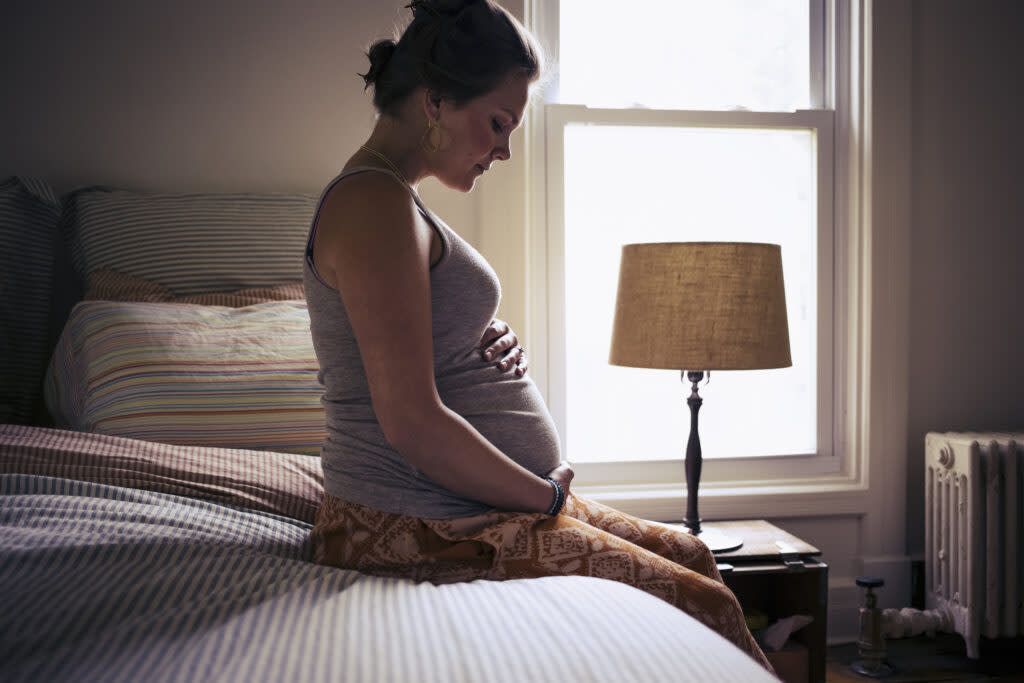OB-GYN: Hospital conversions in rural Alabama could undermine maternal care

A pregnant woman sitting on a bed. An OB-GYN from Clarke County Thursday warned the governing board of the Alabama Department of Public Health about the ongoing maternal health care crisis in the state. (Getty)
Dr. Max Rogers said the board of Alabama Department of Public Health (ADPH) thinks he’s a “broken record” for sounding the alarm on maternal health outcomes in the state.
Each time he raises the issue, Rogers, an OB-GYN based in Clarke County, brings a different perspective to warn the board about worsening outcomes in rural Alabama, particularly the Black Belt.
“I just want everybody in this room, at the table and around the edges, to understand that we cannot let these obstetrical centers disappear. My fear is and I think it’s reality — these people can’t get to obstetrical care every time right now,” Rogers said at Thursday board meeting.
Rogers spoke at the end of the meeting when asked if any board members had questions or comments. He said he felt “compelled” to speak “on behalf of women’s health right now in the state of Alabama.”
GET THE MORNING HEADLINES DELIVERED TO YOUR INBOX
Rogers also said that rural emergency hospitals (REHs) are probably making the issue worse.
In 2023, the U.S. federal government authorized REHs as a way to respond to rural hospital closures and to give rural communities more access to health care, according to the Centers for Medicare and Medicaid Services (CMS). They are allowed to provide emergency services, observation care and outpatient medical and health services that do not exceed an annual per patient average length of stay of 24 hours.
Rogers said that since REHs are prohibited from providing inpatient services, especially labor and delivery, it further hampers access to maternity care.
“I’m a big supporter of REHs and I think they are going to keep a lot of hospital doors open, but at what cost?” Rogers asked.
A 2022 report from the March of Dimes found that over one third of counties in Alabama are maternity care deserts. The report also estimated that women across Alabama travel 17.4 miles and 23.5 minutes, on average, to their nearest birthing hospital. Those who have the highest travel times could travel up to 71.9 miles and 78 minutes on average.
REHs, while beneficial for health care access, may have unintended consequences, according to a University of Michigan study published in the Journal of the American Medical Association in March 2023. The study suggests proactive monitoring and resources for communities to restore full hospital services.
Danne Howard, deputy director of the Alabama Hospital Association, said in an interview Thursday that the association has worked with regulatory authorities and the Alabama Department of Public Health to ensure REHs have the option to convert back to a hospital with more services if their financial situation improves.
“If we get some of the financial issues that they face addressed — one of the biggest things in the state is closing the coverage gap — but there are other reimbursements at the federal level, through Medicare and other things,” Howard said.
Converting to a REH may decrease access to services in a community, but she said that REHs is better than having no services.
“When a rural hospital has no other option, the option to convert to be a rural emergency hospital ensures that the community now does not lose access to emergency care and other services, (and) that the hospital would still be able to provide such as the diagnostic work,” Howard said.
She said that with labor and delivery, having an emergency room is better than giving birth on the way to a hospital, without any medical care.
“If that woman shows up in a hospital emergency room to give birth, it’s most likely that she doesn’t have an OB GYN. Therefore, she might not have had a lot of prenatal care, and so it might make it a higher risk pregnancy than it would have otherwise been,” she said.
Rogers said that he thinks it’s a “cyanide pill” that hospitals can’t do obstetrics once converting to REH, adding that losing access to obstetrics services in the Black Belt is something the state cannot ignore.
He said that pregnant people can give birth at the REH emergency room, but added that there would likely be no skilled, trained OB-GYN to provide a higher level of care, should it be needed.
“What you’re going to see is worse outcomes. I used to use that term ‘worse outcomes.’ What does that mean? That means babies are going to die in the emergency rooms and mamas are going to die in the emergency room,” he said.
The post OB-GYN: Hospital conversions in rural Alabama could undermine maternal care appeared first on Alabama Reflector.

